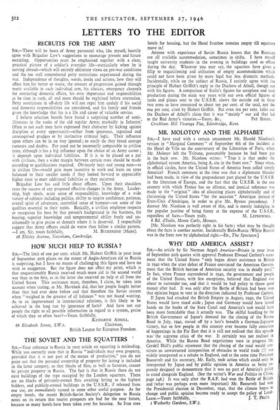WHY DID AMERICA ASSIST ?
SIR,—An article by Sir Norman Angell America—Britain in your issue of September zoth quotes with approval Professor Elwood Corbett's state- ment that the United States "only began direct assistance to Britain in 1940 when the utter defeat of France convinced the American Govern- ment that the British bastion of American security was in deadly peril." In fact, when France surrendered in 1940, the government and people of the United States, with few exceptions, believed that England was about to surrender too, and that it would be bad policy to throw good money after bad. It was only after the Battle of Britain had been won that opinion began to veer in the direction indicated by Professor Corbett.
If Japan had attacked the British Empire in August, 194o, the United States would have stood aside ; Japan and Germany would have joined hands on the banks of the Suez Canal and America's task would have been more formidable than it actually was. The skilful handling by the British Government of Japan's demand for the closing of the Burma Road in July, 1940, staved off by a hair's breadth a German-Japanese victory, but so few people in this country ever become fully conscious of happenings in the Far East that it is still not realised that this episode was' the supreme crisis of the war. It certainly was not realised in America. While the Burma Road negotiations were in progress Mr. Cordell Hull's public statement that the closing of the road would con- stitute an unwarranted interposition of obstacles to world trade (!) was widely interpreted as a rebuke to England, and at the same time President Roosevelt and his secretary, Mr. Early, took action which could only he interpreted by Japan and by public opinion in America as being ex- pressly designed to demonstrate that it was no part of America's policy to stand alongside England. (Seethe writer's War and Politics in China, page 246.) It was only after the R.A.F. had won the Battle of Britain and (what was perhaps even more important) Mr. Roosevelt had won the Presidential election iti December, 1940, that the climate began M change and public opinion became ready to accept the policy of Lend-


























 Previous page
Previous page